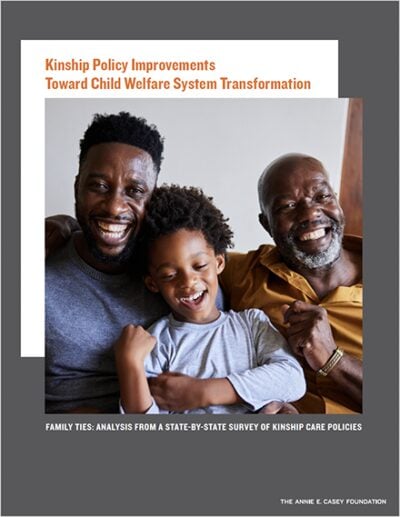Summary
The Annie E. Casey Foundation enlisted Child Trends to survey state child welfare administrators as a follow up to a comprehensive survey conducted in 2007. Agencies in the 50 states, the District of Columbia and Puerto Rico received the 2022 survey, and 46 locations completed it. This publication shares the 2022 survey results, which help to advance the field’s understanding of what states are doing to find, inform and partner with kin when a child enters foster care. It is the final installment of the five-part Family Ties series, released in 2024.
Previous Family Ties briefs examined:
Survey Findings
Enthusiasm for developing policies that promote and support kinship care has accelerated since 2007, fueled in part by new federal funding and regulations. Findings from the 2022 survey show robust implementation of the Fostering Connections to Success and Increasing Adoptions Act of 2008 — with most states (37) allowing the waiver of certain licensing standards for kin, 12 states requiring relatives be notified more quickly than the federal requirement of 30 days after the removal of a child and most states requiring family team meetings at some point in a case.
Although there has been positive change since 2007, service disparities related to kinship diversion arrangements and unlicensed versus licensed caregivers remain. Additionally, child welfare agencies can and should do more to engage and partner with kinship caregivers for policy improvements.
Most states reported including the perspectives of these individuals in decision making regarding policies, but a deeper level of engagement and support is far from broad implementation. About half of states report that their child welfare agencies are required to work with a kinship caregiving advisory board or committee with representation from individuals with personal experience in kinship caregiving. Only nine states report compensating kinship caregivers who serve on advisory boards or committees for their time. Agencies consulting with kin caregivers can ensure policies and practices will meet the needs of children and families.
Using the report’s data and recommendations, which include taking advantage of new federal rules and funding, policymakers have a great opportunity to create and implement policies to provide kin with adequate support and empower them as key resources in strengthening and stabilizing families.
Data Tables
The data tables for this brief share a more detailed look at states’ responses regarding whether kinship navigator programs serve children outside the child welfare system; strategies to incorporate the perspectives of kin, youth and birth parents in policy and practice improvements; and analyzing data by race and ethnicity.






